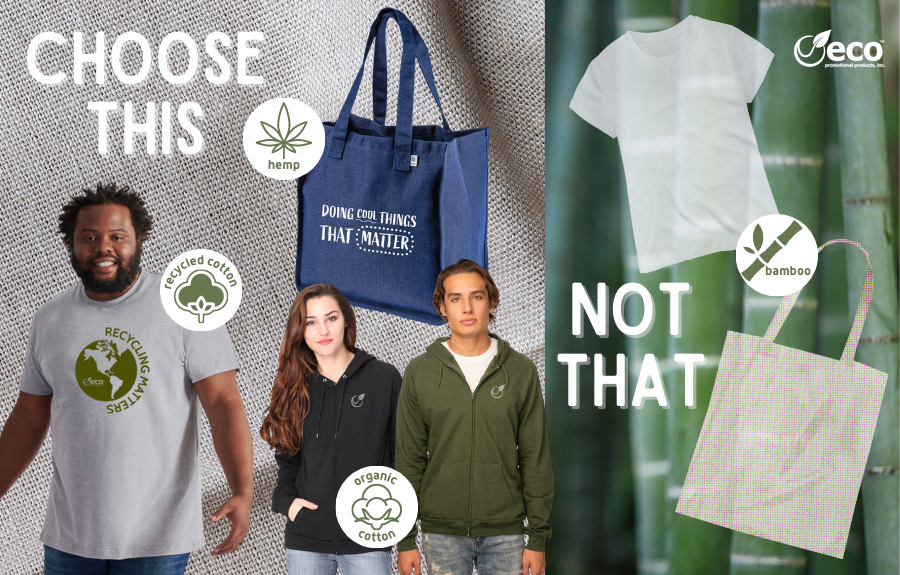Don’t Believe the Green Labels; Bamboo Clothing, Tote Bags and Bed Sheets Aren’t as Eco-Friendly as You Think
It’s not just retail giants who are touting bamboo apparel as eco-friendly. A web search for eco-friendly branded apparel will provide many websites selling super soft and comfortable bamboo t-shirts. While they may be soft, don’t be fooled. Bamboo fabric is not eco-friendly. At Eco Promotional Products, you will find dozens of bamboo products and dozens of eco-friendly shirts and bags. What you will not find is bamboo clothing or bamboo tote bags. As a leader in the eco-friendly promotional products space, Eco Promotional Products discontinued bamboo clothing and all other items made from bamboo fabric more than a decade ago.
Bamboo is the fastest-growing plant in the world and is nature’s most sustainable and renewable resource. A member of the grass family, it is 100% naturally grown, without assistance from man, and is naturally regenerative. Bamboo has an extensive root system that sends out an average of four to six new shoots per year, naturally replenishing itself and growing to heights of 60 feet or more. Some bamboo species grow up to four feet per day, can be harvested every three to four years, and do not need to be cut at the root. Bamboo spreads rapidly across large areas; because of this, it is known to improve soil quality in degraded and eroded areas of land. Bamboo requires 1/3 the amount of water to grow than cotton uses and has no natural pests, allowing it to grow without fertilizers, pesticides, or chemicals.
While bamboo in its original form is highly sustainable and has many environmentally friendly attributes, turning bamboo into fiber for clothing, sheets, furniture, etc., is an unacceptable, chemically intensive process.
Most bamboo textiles are made from viscose rayon, which is created from bamboo or wood pulp processed in a toxic bath of chemicals that generates significant pollution harmful to factory workers and the environment. Dr. Paul D. Blanc is a professor of occupational and environmental medicine at the University of California, San Francis and the author of the book “Fake Silk: The Lethal History of Viscose Rayon.” In an article in B Corp’s B Magazine Bland said, “If you buy something that has even 50 percent viscose rayon, don’t kid yourself [that you’re] buying a ‘green’ product.” This highly informative article also includes a helpful “fake bamboo glossary.”
For truly natural, eco-friendly apparel and bags, choose items made from organic cotton, which is grown without pesticides. Recycled cotton textiles are also highly sustainable. This fabric is made with post-industrial and post-consumer waste and uses far less water and energy to produce in comparison with conventional and organic cotton. Hemp is another eco-friendly fabric option. It is a rapidly renewable plant that can be grown without the use of pesticides.
Additionally, look for certifications on how and where sustainable clothing is made. The Global Organic Textile Standard (GOTS) was developed by leading standard setters to define worldwide recognized requirements for organic textiles. For example, our unisex full zip hooded organic cotton sweatshirt is just one of many of our products made in a GOTS-certified factory.



